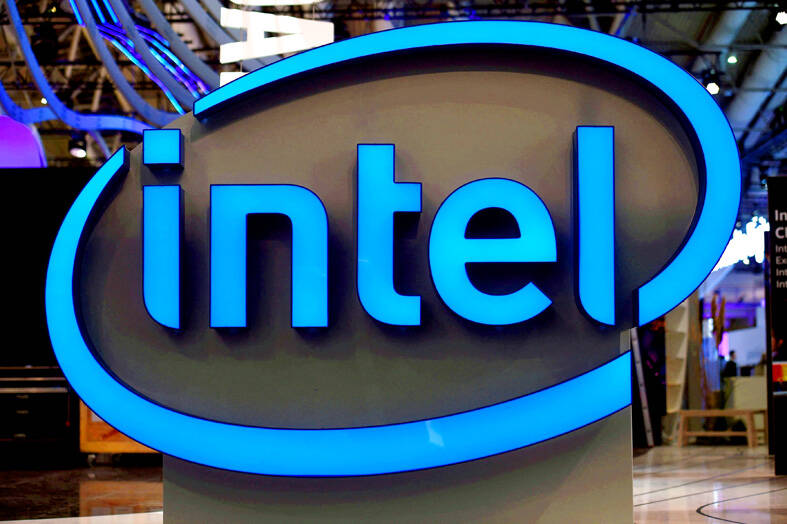Intel Corp is to delay construction of its planned German chip plant and is seeking more in government subsidies, Volksstimme reported.
The US-based chipmaker earlier this year announced plans for a mega site worth 17 billion euros (US$18 billion) in Magdeburg. Construction was set to begin by the middle of next year, and the German government planned to provide 6.8 billion euros in state aid.
The cost has risen to 20 billion euros, Volksstimme reported.

Photo: Reuters
Intel no longer has a planned start date for construction and wants the German government to increase subsidies, the report said.
Although Intel has not made any official announcements about a delay, it said in a statement on Saturday that “much has changed” since the company disclosed plans to build in Magdeburg.
“Geopolitical challenges have become greater, semiconductor demand has declined, and inflation and recession are disrupting the global economy,” the statement said.
The company is monitoring the situation, and “will pace these investments with the market,” it said. “We cannot predict the market recovery, but we do know it will recover as it always has in the past after a down cycle.”
The EU has an ambitious goal of producing 20 percent of the world’s chips by 2030.
The European Chips Act is still moving through the legislative process, but has already prompted a number of companies to make investments, of which Intel was the largest. High energy prices, a market downturn and even subsidies from the US’ Inflation Reduction Act could threaten the plans.
Meanwhile, former Volkswagen AG chief executive officer Herbert Diess is set to become chairman of the supervisory board at German semiconductor manufacturer Infineon Technologies AG, the company said on Friday.
Diess “is expected to assume the role,” subject to a vote at an annual general meeting in February, taking over from Wolfgang Eder, Infineon said.
Eder, who has been in the position since 2019, said Diess was “the ideal candidate to become my successor, touting his “excellent knowledge of the company and of the industry landscape.”
Infineon last month unveiled plans for a 5 billion euro new factory in the eastern German city of Dresden, as Europe races to reduce its reliance on semiconductors made in Asia.
A global shortage of semiconductors, spurred by a COVID-19 pandemic boost in demand for consumer electronics, has snarled international supply chains and forced manufacturers to trim production in a range of industries.
German vehicle manufacturers have been among those hit hard, as semiconductors are a crucial component in both conventional and electric vehicles.
Diess stood down as chief executive officer of Volkswagen in September, handing the wheel to former Porsche AG chief executive Oliver Blume after four turbulent years in charge.
Under Diess, Volkswagen became the first legacy vehicle maker to try to follow US upstart Tesla Inc by seeking to develop centralized electronic vehicles.
However, the drive proved controversial, with critics saying that Diess had moved too fast, while underestimating how complicated it was to shift in-house an operation that was not among the vehicle maker’s core expertise.

Nvidia Corp chief executive officer Jensen Huang (黃仁勳) on Monday introduced the company’s latest supercomputer platform, featuring six new chips made by Taiwan Semiconductor Manufacturing Co (TSMC, 台積電), saying that it is now “in full production.” “If Vera Rubin is going to be in time for this year, it must be in production by now, and so, today I can tell you that Vera Rubin is in full production,” Huang said during his keynote speech at CES in Las Vegas. The rollout of six concurrent chips for Vera Rubin — the company’s next-generation artificial intelligence (AI) computing platform — marks a strategic

REVENUE PERFORMANCE: Cloud and network products, and electronic components saw strong increases, while smart consumer electronics and computing products fell Hon Hai Precision Industry Co (鴻海精密) yesterday posted 26.51 percent quarterly growth in revenue for last quarter to NT$2.6 trillion (US$82.44 billion), the strongest on record for the period and above expectations, but the company forecast a slight revenue dip this quarter due to seasonal factors. On an annual basis, revenue last quarter grew 22.07 percent, the company said. Analysts on average estimated about NT$2.4 trillion increase. Hon Hai, which assembles servers for Nvidia Corp and iPhones for Apple Inc, is expanding its capacity in the US, adding artificial intelligence (AI) server production in Wisconsin and Texas, where it operates established campuses. This

US President Donald Trump on Friday blocked US photonics firm HieFo Corp’s US$3 million acquisition of assets in New Jersey-based aerospace and defense specialist Emcore Corp, citing national security and China-related concerns. In an order released by the White House, Trump said HieFo was “controlled by a citizen of the People’s Republic of China” and that its 2024 acquisition of Emcore’s businesses led the US president to believe that it might “take action that threatens to impair the national security of the United States.” The order did not name the person or detail Trump’s concerns. “The Transaction is hereby prohibited,”

Garment maker Makalot Industrial Co (聚陽) yesterday reported lower-than-expected fourth-quarter revenue of NT$7.93 billion (US$251.44 million), down 9.48 percent from NT$8.76 billion a year earlier. On a quarterly basis, revenue fell 10.83 percent from NT$8.89 billion, company data showed. The figure was also lower than market expectations of NT$8.05 billion, according to data compiled by Yuanta Securities Investment and Consulting Co (元大投顧), which had projected NT$8.22 billion. Makalot’s revenue this quarter would likely increase by a mid-teens percentage as the industry is entering its high season, Yuanta said. Overall, Makalot’s revenue last year totaled NT$34.43 billion, down 3.08 percent from its record NT$35.52